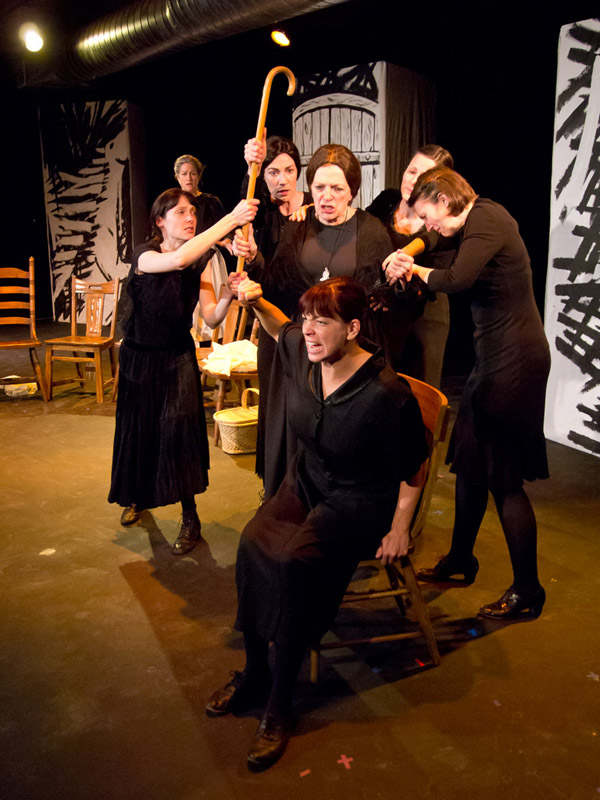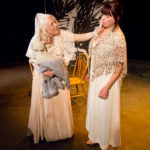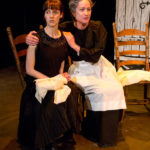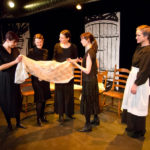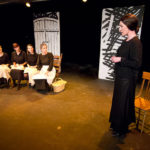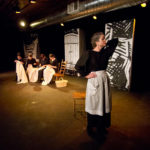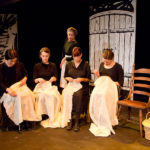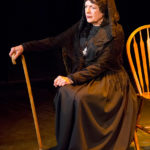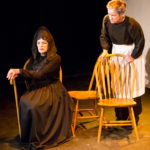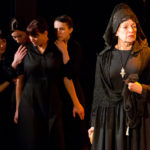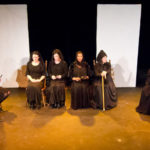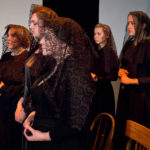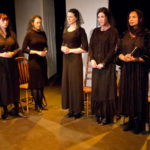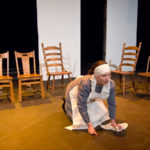Production stills taken by Michael Brunk.
Off-limits Audition Monologues/Songs
There has been a lot more buzz around auditions in the past few weeks, with TPS Generals and other major auditions going on at the same time. One of the most frequently asked questions has been whether a monologue or song is overdone, or whether X song from a musical on Broadway was off limits.
As a director, my personal belief that nothing is off limits. Last year, during TPS Generals, three women did the exact same Juliet monologue. On the same day. But you know what? I remember one of them. She was brilliant. The others I have no idea who they were. And she wasn’t the first one.
While I might wince at a novice performer trying to sing “Defying Gravity” from Wicked because it’s their favorite show, someone who can nail the song should sing it. The same goes for Sondheim – there is this belief that you should never sing Sondheim at an audition, especially for a Sondheim show (I’d like to know who came up with that one.) If you can perform a mind-blowing version of one of Sondheim’s songs, then please do; I want to see excellence at an audition.
So while careful consideration must be given to whether a monologue or song is right for you, you shouldn’t concern yourself with whether it’s overdone or not if it’s the piece that best showcases your skill.
Auditions for The House of Bernarda Alba
Audition notice for The House of Bernarda Alba by Federico Garcia Lorca in a new adaptation by Emily Mann, Directed by Charles Waxberg and Roy Arauz
Audition Date
Saturday, February 18, 2012
1:00-4:00 pm*
*UPDATE: most slots between 1-4 pm are now taken. We are now scheduling auditions from 4:00-5:00 pm.
Email auditions@arouet.us for an appointment. Please attach a resume and headshot if available.
Audition Requirements
- 2 monologues, maximum 4 minutes total length
- 1 – A monologue of size and intensity
- 2 – A classical monologue
Lorca’s final masterpiece, The House of Bernarda Alba centers on Bernarda as she tyrannically rules over her house and five daughters, cruelly crushing their hopes and needs. The play explores themes of suppressed sexuality, passion, and the oppression of women.
All Roles Open
Bernarda—A widow who exerts excessive will over her daughters.
María Josefa—Bernarda’s mother. Bernarda keeps her locked in her room.
Angustias—Bernarda’s eldest daughter, is sickly, desperate to marry and be free.
Magdalena—Bernarda’s daughter, devastated by her father’s death.
Amelia—Bernarda’s daughter, gossipy but submissive to her mother
Martirio—Bernarda’s daughter. The martyr, she feels weak and inferior.
Adela—Bernarda’s daughter. The only one to defy her mother.
La Poncia—the sturdy housekeeper
A maid—another maid of the household
Prudencia—dinner guest
Production Information
Rehearsals begin Saturday, March 24, 2012
Performances
May 4-19, 2012
Performances at The Ballard Underground, 2220 NW Market Street, Seattle
Compensation
Arouet is a profit-sharing company. (All profits will be shared equitably)
FAQ
What is your criteria for a classic monologue?
- A classic monologue, in this case, would be heightened language. Technically, classic is before Ibsen (1877), however we want to hear you handle poetic language or heightened language, so for example G.B.Shaw is okay as well and most verse plays.
Can you clarify what you mean by a monologue of size and intensity?
- A monologue of heightened emotion, stakes, and passion. We want to see that you can handle the intensity of the play with truthful commitment.
Why You Should Support The House Of Bernarda Alba
Hey! It’s John. I don’t normally post on the Arouet website, and this is the first time I’ve posted here without letting Roy know about it first. Sorry, Roy. It’s a sneak attack of loving support from someone with admin rights!
To anybody that knows Roy, it is no surprise that he is dedicated to theatre. His commitment to bringing The House Of Bernarda Alba to Seattle is unparalleled. Right now, right this second, Roy is working like crazy on Kickstarter to raise funds for The House Of Bernarda Alba.
The problem I have with this process is that to you, this just like another polished pitch. Even Roy’s closest friends and supporters don’t get to see the “behind the scenes” passion that Roy carries with him day and night.
It wasn’t until we were finishing up the second video where I clearly saw his determination to get things as close to perfect as possible. Even though I am a complete hack at making little iMovies, Roy’s eye for detail is sharp and he will only accept the best. Until he is 100% satisfied, he isn’t done.
And I started thinking, isn’t that exactly why you should help fund this show?
Go to Arouet’s Kickstarter page and contribute! The House Of Bernarda Alba will be in the best of hands.
[box]J.S. Epperson is the sound designer for The Gene Pool and Frankie and Johnny in the Clair de Lune. He has previously created sound and voice over work for Arouet, Arts West, Redwood Theatre and Theatre 9/12. You can read a clever paragraph or two about Epperson over on his website. Read some fabulously nerdy blog posts at Arouet.[/box]
Why Bernarda Alba? Why now?
Once La Segua was put on hold, there was no doubt in my mind that the next play on the list would be The House of Bernarda Alba. Ever since the ninth grade, when we were required to stage it for Spanish class – yes, I was IN it, don’t ask! – the play has remained close to my heart.
The very first production I saw was at a small theatre next to the bus stop in San José, Costa Rica, in a space quite similar to The Ballard Underground in Seattle. One of the first plays I saw live, it was haunting and exciting and brilliant, and solidified my love affair with the performing arts. I have now seen the play twice, twice as a dance performance, and once on film. I feel the time is right for me to produce it, and even though I am not directing, I am thrilled to be the assistant to director Charles Waxberg, my friend and mentor.
The story is about the stern, tyrannical, mother who calls for an eight-year mourning period for the death of her second husband, cutting off her five single daughters from the rest of the world, depriving them of human contact. Even under her watchful eye and dictatorial power over the home, the daughters rebel. In as much as Bernarda Alba is a play about repressed sexuality, it is a play about oppression and censorship. García Lorca wrote it during the Franco years and was killed for his political views shortly after the play was finished. They tried to silence him, yet his work continues to be presented around the world. We see this today in the Middle East, where after years of oppression, people are fighting for freedom. As a gay man, I see it in the U.S. as we fight for equal rights. The themes of the play remain relevant, and will as long as people’s basic freedoms continue to be threatened.
The House of Bernarda Alba has not been seen on the Seattle stage for a long time – I can’t tell you since when because all my searches have come up empty handed thus far. I would like to change that.
To Kickstarter!
2011 was a banner year. I launched Arouet, and with the support of friends produced two plays that I longed to direct. I got to work with fantastic people, received good notices, and am as inspired as ever to move forward with the company, this time producing the Spanish masterpiece The House of Bernarda Alba by Federico García Lorca.
Unfortunately, the cash that remained after The Gene Pool does not cover the expenses to produce another play, and I had to figure out a way to raise the remaining balance. With the broader appeal of the show and following in the footsteps of other recent productions, I thought it would be great to invite you to be a backer, with contributions starting at $1 anyone can be a producer! I heard about Kickstarter from other companies that had just run successful campaigns, and after doing some research, it truly is the most appealing way to raise funds. People can contribute any amount, it makes it very easy to communicate with the backers, and the finances are quite easy to manage on our end. Plus we tie some fun rewards to your contributions.
Creating the campaign was interesting and fun. It’s a completely different fundraising model, very different from anything I had done before. The one thing they strongly recommend is creating a video, which was by far the most challenging part of the process, and by far the most fun. I am very self-conscious and not particularly clever, so I recruited my partner (in life and in crime) to help me come up with something fun. After spending an entire evening working on the first version, I was suddenly inspired and went on a totally different direction. There are still a couple of things I would like to fix, but overall I am quite happy with it. Make sure to check it out.
How it works: we set a funding goal of $3,250 and a deadline of December 23, 2011. You can pledge any amount, staring with $1. There are rewards attached to the incremental value of your pledge, from a thank you email to having your name above the title as a producer. If we meet or surpass the goal by the deadline, you get charged, we get the money, and we move forward with the production. If we don’t meet the goal, you don’t get charged. It’s an all or nothing deal.
So click on over to Kickstarter, take a look, and become a backer. Bernarda Alba and her daughters have been absent from the Seattle stage for too long.
The House of Bernarda Alba
 The House of Bernarda Alba
The House of Bernarda Alba
(La Casa de Bernarda Alba)
by Federico García Lorca
adapted in English by Emily Mann
May 4-19, 2012
At the outbreak of the Spanish Civil War in 1936, Federico Garcia Lorca finished what would be his final masterpiece, The House of Bernarda Alba. Two months later he was killed for his leftist politics.
After the death of her second husband, Bernarda Alba decrees a traditional eight-year mourning period. Tyranically ruling over her five daughters, she will do anything to safeguard her family’s place in the community and daughter’s futures. Jealousy and suppressed sexuality quickly rise to the surface, leading to rebellion and a tragically inevitable ending. Expressing the costs of repressing the freedom of others, 75 years later The House of Bernarda Alba is still a timeless work, particularly in today’s political climate.
Meet the Cast and Crew of “The House of Bernarda Alba”
Take a look at the rehearsal and production galleries.
What the critics had to say: Review Roundup
Performance Location
The Ballard Underground
2220 NW Market Street
Seattle, WA 98107
Ticketing
Festival Seating
- General Admission: $15 advance purchase/$18 at the door
- Student: $12 advance purchase/$15 at the door
- Senior: $12 advance purchase/$15 at the door
Premium Seating
Do something special! There are four Premium Tickets per performance. Premium Tickets include:
- Reserved seating
- Priority entrance
- A drink tickets
- Available only at brownpapertickets.
- Each Premium Ticket is only $50
Advance/credit card purchase tickets available at Brown Paper Tickets.
Rush Tickets
$10 at the door, sold five minutes prior to showtime, depending on availability. Rush Ticket availability is not guaranteed; tickets sold on a first-come, first served basis. Cash only.
* Premium Seating: Four tickets will be available for each performance at this price. Premium Seating includes reserved seating, priority admission, and a drink ticket.
Purchase/Reservations
For reservations, email boxoffice@arouet.us or call (425) 298-3852. Please note, cash and check at the door only. Reservations are held until 5 minutes prior to showtime.
Special Thanks To…
The House Of Bernarda Alba is possible thanks to our successful Kickstarter campaign. We would really like to thank our backers!
In-kind support provided by Otak, Inc.
You Never Know
A few weeks ago I took a trip back east to visit my sister in DC and some friends in NYC. The main purpose of the trip was to see friends, but I had scheduled some time to see a reading of my friend Doug DeVita’s play, BBQ.
I had read the first few pages of the play before, so I had an idea of what to expect. I already had an actor in mind for the male lead, and it was quite interesting that the gentleman reading the part was the “same type”. That was definitely a good omen!
Needless to say, the reading went very well. I loved the play and the actors that read the parts. The reading was followed by a lively discussion afterwards where we all gave our feedback. It was a little surreal for me to be doing that in New York City with professional actors.
Late that night, after the party that followed, sitting in the living room over a great conversation I decided to produce BBQ next year. As Doug puts the finishing touches on the script, I am now on task: fundraising, finding a space, scheduling, and the getting those rushes of adrenaline again.
Who would’ve thunk six years ago when I first logged into BroadwayWorld that it would lead to this? For now, visit our page for BBQ and stay tuned for casting and production dates.
BBQ
“If we’re lucky, the people we loved – parents, friends, lovers, whatever – stick around until we’re ready for them to leave. If we’re lucky, they leave before things become impossible. But the trick is to recognize that precise moment of change, to be able to gracefully let go of a past that may never have been the way you want to remember it, and to embrace a present that is just dying for change.”
 Philip and Barbara have been friends since they were 5 years old. Now nearing 50, the only thing keeping their friendship alive may just be its longevity, as they come to realize that each is not the person they believe and/or want the other one to be during one intense Sunday afternoon barbeque.
Philip and Barbara have been friends since they were 5 years old. Now nearing 50, the only thing keeping their friendship alive may just be its longevity, as they come to realize that each is not the person they believe and/or want the other one to be during one intense Sunday afternoon barbeque.
Pre-production Developmental Reading
Monday, May 21, 2012 at 7:30 pm
Location: Illsley Ball, Nordstrom Recital Hall (Backstage) at Benaroya Hall. Enter at the Artist Entrance located on 2nd Ave. at Benaroya Hall
Directed by Roy Arauz
Admission: FREE
Featuring Greg Brisendine, Jeff Church, Frances Hearn, and Carissa Meisner Smit
About The Playwright
Doug DeVita has written the books for two musicals which were produced at Vital Children’s Theatre in New York: The Tempest (music and lyrics by Brian Allan Hobbs) and As You Like It (music and lyrics by Paul Johnson). His play Just A Rumor (co-written with Gary Lyons) was a semi-finalist at the Eugene O’Neil Playwright’s Conference and has had developmental readings at New York’s Abingdon Theatre Company and London’s Menier Chocolate Factory. Other plays include Confessions of a Serial Egg Donor, Things Seen, Gold Diggers of the 1, 2 & 3, and Something To Dance About (the last two also co-written with Mr. Lyons.) Mr. DeVita is a proud member of The Dramatists Guild of America.
Your Reputation Precedes You
Your reputation is important. Seriously. I’ll wait while you look it up.
Okay, so earlier I addressed how you begin to establish your reputation at the audition stage. You may have spent years establishing a good reputation, but all it takes is one mistake to damage it; the kind of damage that could take years to overcome and that will never be forgotten by anyone. Even though this is true of all areas of life, this is particularly true of tight-knit professional communities such as the theatre community.
If I see in a resume that you have worked with someone I know well, I contact them to ask how you are to work with. I listen to the production team when they have an opinion about you.
When I was stage managing, you can bet that I spoke up when an actor that was particularly difficult to work with was considered for a role. If I’m producing, then I will most likely block said casting.
Of course I’ve had my share of missteps. For example, once I was choreographing a show where the director and I simply didn’t get along: at times we even argued in the presence of the cast. That experience established my rule of keeping the peace in front of the cast and crew: when disagreements crop up, they are addressed privately. In another instance, the director for a show I was stage managing and I had some major communication issues that surfaced during the tech/dress rehearsal process. This lead to a very stressful – and long – tech. Unfortunately, my reputation precedes me at those theatres: it is unlikely that I will be asked to work at either company again.
In the age of Facebook and Twitter, gratification is instant, status updates are immediate and the filter between your emotions and pithy comments isn’t always functional: remember that everyone is reading your profile updates. Previous status updates and Facebook behaviors have been a factor in my casting decisions and I make mental notes of what you’re saying long before I am even considering you for a gig.
I had an actor audition for a show that I was directing. She kicked ass from the moment she walked in: she had great presence, a beautiful voice, and she did a great reading. I wanted to consider her for all the female leads, she was that good! Alas, the minute she stepped out of the room there was a resounding “No!” from the rest of the production team. It turns out she had a reputation for being extremely difficult. I looked up her previous experience, and saw that she was someone a friend had stage managed before and he had warned me about her. She wasn’t even called back.
Particularly difficult is dealing with children. Ok, not children. Personally, I love working with children. Their parents are another story. I have not cast a child before because their parent had a reputation for being demanding and a pain to the production crew. After stage managing dance recitals and choreographing a couple of shows with children, I set out a rule when I direct that parents are not allowed at all in the rehearsal room, unless invited in. Even though this has created some unhappiness at the start, in the end it has been best for all.
Theatre companies and spaces also have a reputation to observe. Do you treat your hired directors professionally and with respect? Do you provide what you promise? Do you provide actors with reasonable rehearsal conditions? There are theatres that I won’t work at because of the experiences of others there. There are also theatres that get it right, and when that happens I make sure to let everyone know too. Arouet’s contract not only states what is expected from actors, it states what actors can expect from Arouet.
Be respectful of everyone you work with. I remember how I have been treated by other directors; some I liked and some not so much. I do my best to emulate the ones I liked and remind myself of what I didn’t like and steer clear of those behaviors. I am more likely to work again with a stage manager that’s honest and willing to learn, even if he/she is a bit green than one that thinks they know everything and fights me along the way. A stage manager that doesn’t treat the cast well will come off my list immediately.
So be mindful of how you treat others, from audition to closing night and beyond. The slightest misstep will come to haunt you later, as I know from personal experience.

